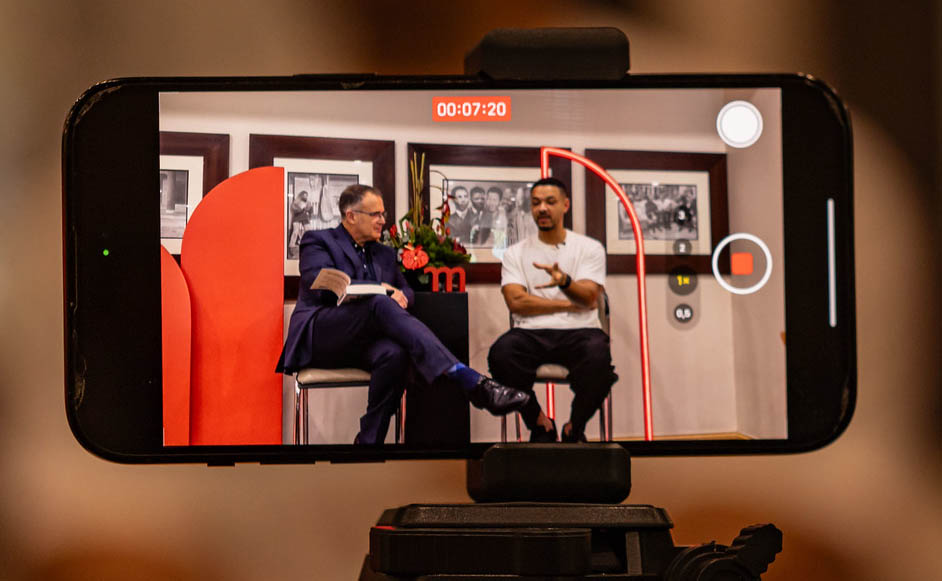
Last week was chaotically busy, and fun! In addition to in depth discussions with deep thinkers from the worlds of business, AI, accounting and leadership, I interviewed a sweet rapper, a very different experience from dealing with a sweet wrapper. I poked and prodded the global phenomenon that is Steven Bartlett, told one of the world’s richest people that they were born lucky and not to waste it, and they agreed. I even had fun with two different sets of accountants and a global investment firm asked me to chat to their clients.
It was great to reconnect with the superlative team at Jersey Finance on their recent roadshow, following on from their flagship Annual Private Wealth Conference in the City of London in September. I have grown over the years to truly appreciate how much trust event organizers put in speakers and panel chairs at their staff and client events. In a world where so much can, and often will go wrong, it’s important to have people you can count on to deliver the outcomes you need to achieve. Being trusted to be able to run with whatever might happen next is a privilege.
A key theme in my talks is that you should never let your preconceptions and biases get the better of you as you navigate an increasingly treacherous global environment, and I was delighted to have my own challenged when the rapper I was interviewing ambled on stage in a lime green suit without a bit of bling on his person.
Zuby, full name Nzube Olisaebuka Udezue was born to Nigerian parents in Luton and sent to boarding school in England when the family relocated to Saudi Arabia. He graduated from Oxford with a first in Computer Science and after three years “where I learned what they could teach me” at Accenture he became a rapper and has since moved into podcasting and found himself interviewed by the prolific Joe Rogan and has recently had an audience with Elon Musk.
Most pictures of Zuby are classic peak capped rapper shots. I was in for a surprise as this soft spoken besuited artist began speaking to the themes I believe in. Things like most people in most parts of the world most of the time are good and honest and simply want the best for their kids in a world where most of us most of the time are decent and hardworking and despite the destructive power of weaponized misinformation. It was cool.
I also got to deliver five versions of my most recent keynote: “How to get Lucky; Where Strategy, Opportunism and Grit Collide, each tailor-made for the audiences they served.
Being on stage is awesome, especially when you see someone in the audience you recognize, and in that moment, must decide how to acknowledge them, if at all. Here, timing is everything. There is nothing creepier and more sycophantic than a suck up on stage. But there are ways of doing it. I got to tell one of the richest people in the world that, like Warren Buffett, they had won the “ovarian lottery” of being born to the right family at the right time and, like other billionaires, was in the rare position to make the world a better place. Jonathan Oppenheimer, scion of the diamond dynasty, took it well, precisely because through his philanthropic efforts, he is doing just that through creating networks and pathways for entrepreneurs to connect and collaborate.
And I got to meet the phenomenon that is Steven Bartlett. Steven has been hustling since he was little, driven by a desire to be financially independent and is involved in building businesses while maintaining a punishing schedule creating podcasts with some of the world’s most influential thinkers.
Steven is positioning himself as a curious thinker on a vast array of topics all centering around the concept of leadership and his Diary of a CEO is topping best seller lists across the globe. He is a sponge for new ideas and disseminator of wisdom which audiences are lapping up. I admired his refusal to be sucked in by the vanity of click bait and quick wins for the sake of traffic and audiences.
Not everyone is a fan.
He is young, 31, good looking, eloquent and deeply thoughtful about the world. That draws plenty of critics, some of whom question his business prowess and see him as little more than a fame-seeking populist. They can say what they like because he remains blissfully unaware of it. In a world where young people are cyber-bullied and ripped to shreds by faceless critics, his example is a good one to follow. He has a circle of those he trusts to keep him on his mission and zones out both positive and negative commentary. The first because vanity can be as much of a distraction as unbridled criticism. If our kids can learn just that from him, they will have learned a valuable survival skill in a hyper-connected world.



